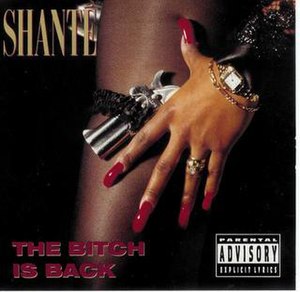| The Bitch Is Back (Roxanne Shanté album) (Photo credit: Wikipedia) |
As I have explained previously, I avoid using gendered slurs because they are inflammatory and add no value to any of the conversations I am interested in having. I understand that not everybody is bothered by such words and that their usage varies considerably across cultures (e.g., many of the Brits I know use "cunt" frequently in very different ways than what we are used to in the U.S.). I am not suggesting that everyone must be equally upset by these words; I am suggesting that these words are often directed at women in online communication and used in ways that are intended to be degrading and hurtful.
I agree with the those who have been calling attention to the effects of such insults and suggesting that they do not belong in broad secular community. Their use contributes to an atmosphere which will undoubtedly be experienced as unwelcome and even unsafe by some women. It makes sense to me that secular organizations would seek to discourage the use of such terms in their harassment policies. Their use does not seem at all consistent with the civility such groups are now promoting.
I focus on gendered slurs here because we have been hearing a great deal about them lately. This does not mean that I condone other sorts of name-calling (i.e., the use of gender-neutral insults). I think we would do well to reduce all of the name calling now taking place in the secular community.
Elevating the Discourse
Those of us who aspire to be rational and who are interested in elevating the level of discourse in our community have an uphill battle. Much of today's Internet-based communication is harsh and juvenile. Anonymity and distance tend to facilitate aggressive behavior, and some of what we see online certainly seems aggressive.
The good news is that online communication does not have to be like this. If we really want our online experience to be different, there are some things we can do. The place to start is obvious: we ought to be interested in modeling calm, respectful communication. We can and will disagree with one another, but we can do so without calling people names that are designed to hurt feelings and debase one's person. Such things do not have to play any part in our disagreement.
Why would we want to elevate the discourse? I am not suggesting that everyone does; that clearly isn't true. But I know that there are those among us who are tired of the name-calling and who would welcome productive disagreement. We recognize that disagreement may be heated at times and that this entails calling each other out for behaving badly. I do not think anyone is suggesting that we set that aside and simply ignore bad behavior. But the name-calling in general and use of gendered slurs in particular manages to do harm while accomplishing nothing of value.
It was this realization that led me to end my Idiot of the Week series last year. I recognized that by labeling those with whom I disagreed as "idiots" that I was feeding the culture of name-calling. That has not meant that I have ignored the behavior of those I used to feature in this series; it has meant that I have focused on their behavior rather than their person. That is, I have made an effort to learn how to disagree.
